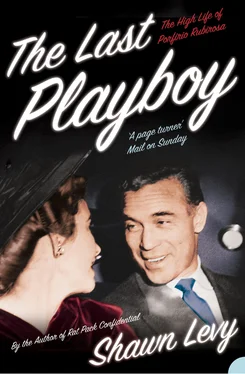He was accepted, enrolling as a second lieutenant in January 1919. Within three years, he had attended an officers training school and been promoted to captain. The Yankees liked him: “I consider this officer one of the best in the service,” wrote one evaluating officer. And he continued to advance, sometimes in shadowy fashion. In 1924, the major under whom he served was killed by a jealous husband; most onlookers assumed that the offended party was put onto the scent of his wife’s affair by Trujillo, who eventually replaced the dead man in rank and duties. By the end of that year, with the North American marines having returned home, Major Trujillo was third in the chain of command of a military force that was virtually unopposed in ruling the land.
All that remained now was to take over.
But before he could ascend to full power, there was a domestic matter to resolve: namely, the peasant girl he had married, hardly a fitting wife for a man of his status. Sexually, Aminta had long since been replaced by a string of women, one of whom, Bienvenida Ricart, Trujillo had singled out as a likely next wife. Divorce by mutual consent was, curiously, legal in the almost homogeneously Catholic Dominican Republic at the time, and in September 1925 the Trujillos’ marriage was dissolved by civil decree. Trujillo was ordered to pay alimony, to provide Aminta with a house, and, to his frustration, to leave Flor de Oro to live with her mother—a detail he would revisit.
A full two years later, serving at the rank of brigadier general, he married Bienvenida. But by then yet another concubine had taken a special place in his heart: María Martínez, who in 1929 would trump her rivals by producing a male heir, Rafael Leonidas Trujillo Martínez, a boy stamped for life with the nickname Ramfis, derived from his father’s love of Verdi’s dynastic opera Aida . Through the coming years, just as he navigated with Machiavellian deliberation the political waters of the nation, so would Trujillo manipulate these women, regularly discarding a lower-class mate for a higher as a means of fashioning his image and his fate: a proper tíguere .
He proved as decisive and ruthless in public life as in private. In the next two years, he moved gradually, in the shadows, to solidify a power base from which he might seize control of the country. In 1928, the National Police was transformed by law into a proper National Army, and Trujillo was named its chief. But he had additional resources at his disposal—thuggish gangs that enforced his wishes and maintained a cordon sanitaire of plausible deniability between his official position and the more brutal imposition of his will.
He patiently bided the ineffective presidency of Horacio Vásquez, the military man whose ascent back in 1924 had convinced the North American occupiers that the country could see to itself. As Vásquez’s health failed and his government weakened toward collapse, various groups jockeyed to replace him. Each knew that it would need Trujillo on its side. None, however, fathomed the deep logic of the situation as well as he or recognized that he had fancied himself the best man to rule the country.
Presidential elections were announced for 1930, and it wasn’t clear that Vásquez was out of the running; many notables—including, at times, Trujillo, at least publicly—declared an interest in his reelection. But at the same time, Trujillo hatched an audacious, sinister plan to usurp the presidency. In broad outline, he would confide in an ally in each opposition party his intention to support its cause by staging a rebellion of disloyal troops in—where else?—the Cibao; when Vásquez sent him to quell the rebellion, for he could turn to no one else, Trujillo would instead take command of it, leading it into the capital and overseeing a rigged election that would put his candidate—whoever that might be—in power.
What Trujillo told almost no one was that he was his own preferred candidate, that he was going to pull his support from whichever side came closest to power when it would be too late to stop him, seizing the top spot for himself. He shared his plans with the American diplomats who monitored Dominican politics from a judicious remove while wielding the threat of a second occupation as a means of influencing the nation’s affairs (the Yanks were still impressed with him, if less than enthusiastic about his plan). He also shared his plans with Don Pedro Rubirosa, who declined to take part.
The scheme was so risky that Trujillo hedged against failure by keeping a small fortune in cash at the ready should it fail and he be forced to flee. As it turned out, it went almost exactly as he’d planned. He found credulous dupes in each political camp and played them sublimely: Each man, in his own ambition to usurp the presidency, was certain he had the army’s support. He fomented just the right amount of faux unrest in the Cibao; when Vásquez felt himself nervously in need of a stronger military of his own, Trujillo was promoted to minister of national defense. A little more than a week later, as the phony revolt approached the capital, Vásquez, masterfully gulled, demanded assurances of loyalty from Trujillo and, mollified, directed him to stave off the impending coup. Trujillo sent a token platoon to oppose the insurrection—with orders, of course, to join rather than stop it—and then holed himself up with a more sizable and better-armed force in the chief redoubt of Santo Domingo, the Ozama Fortress. And there he sat implacably, insisting on his loyalty to Vásquez while the besieged president was forced to resign without a shot being fired in his defense.
Trujillo allowed his coconspirators in the opposition briefly to enjoy a show of control over the nation. And he equanimously allowed the presidential election to be held, with Vásquez’s party still permitted to run a candidate. But the whole thing was a dark farce. Everyone who might have taken power had been suborned by Trujillo into treason; no one could risk exposing his own deceit by stepping forward to claim the reins. Trujillo used frank acts of intimidation and violence to curb any dissent to his own puppet candidate, Rafael Estrella Ureña, and then simply strong-armed the man out of the race. The sham election was protested even before it occurred: An oversight board resigned en masse a week before the balloting. In May 1930, Trujillo was elected president by a near unanimous (and patently fabricated) majority that would have made the most megalomaniacal despot envious; in August, amid the high pomp he had felt was due him even in his days as a telegraph operator, he was inaugurated.
With epic tenacity and iron severity, Trujillo would so impose his personality on the Dominican Republic and its people that there would be no appreciable distinction between the man and the nation. Stalin, Mao, Castro, Amin, Ceausescu, Hussein, Kim Il Sung: none would have the same degree or depth of impact on the psyche of his people. In the course of time, every home in the country would boast a sign reading “God and Trujillo”—often right out on the roof in huge letters. Santo Domingo would be renamed Ciudad Trujillo; calendars would all be dated according to the Era of Trujillo, with 1930 as Year One; Pico Duarte, at ten thousand feet the highest peak in the Caribbean, would be renamed Little Trujillo—as opposed, of course, to the big one who sat, literally, on the throne in the National Palace; the first toast at any formal dinner, especially those at which he was not in attendance, would be to the health and honor of Trujillo; and he would be spoken of not as the President or the Generalísimo or the leader but, unironically, as the Benefactor.
These ritualistic incarnations of the cult of personality didn’t emerge immediately after Trujillo took power. No, before the tíguere Trujillo could metamorphose from soldier to god, certain parties reluctant to being held in his domain would have to be made to knuckle under. In particular, there was the refined circle of bourgeois families who dominated the social and cultural life of the capital. Educated, traveled, wealthy, born to relative privilege, they looked frankly down their noses at Trujillo with his mean roots, antiquated manners, and precise mien. In 1928, still merely an ambitious officer, Trujillo had stood for election to the Club Unión, one of Santo Domingo’s most elite social institutions, and was admitted because, as everybody who observed the process knew, somebody acting under his orders had tampered with the vote. That he nevertheless went ahead and joined and attended the club was the most desperate sort of social climbing; Trujillo felt the sting of having been forced to embarrass himself and filed it away for future vindication. His revenge was swift: In 1932, after filling the club with military officers, he was elected as its president, transferred the entire membership wholesale to a newly formed premises, and had the genteel old home of the Club Unión razed.
Читать дальше












